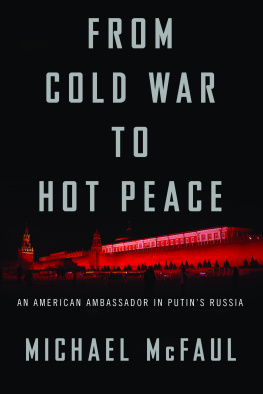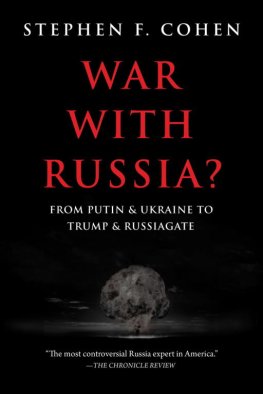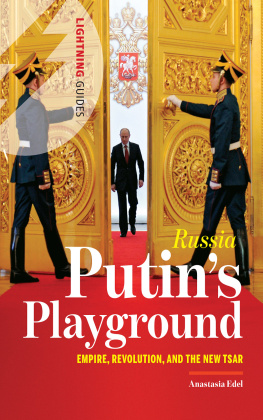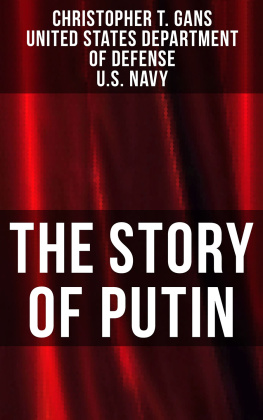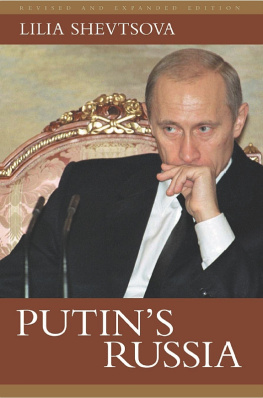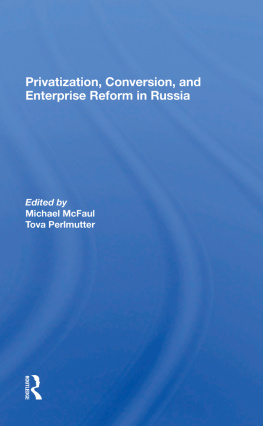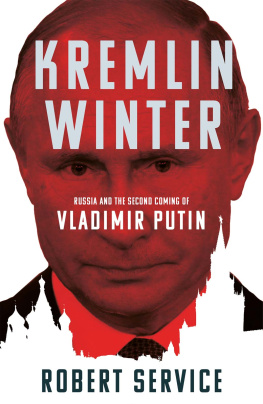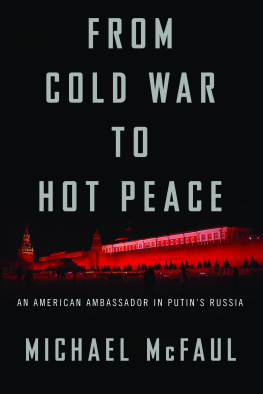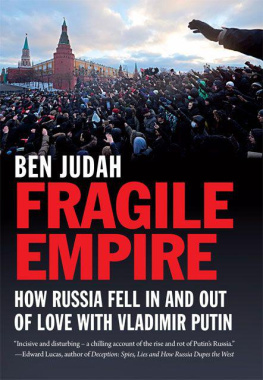Contents
Revolution
Reset
Reaction
Copyright 2018 by Michael McFaul
All rights reserved
For information about permission to reproduce selections from this book, write to or to Permissions, Houghton Mifflin Harcourt Publishing Company, 3 Park Avenue, 19th Floor, New York, New York 10016.
hmhco.com
Library of Congress Cataloging-in-Publication Data is available.
ISBN 978-0-544-71624-7 (hardcover)
Cover design by Brian Moore
Cover image O. Louis Mazzatenta/Getty Images
Author photograph Tiffany Ong
e ISBN 978-0-544-71625-4
v1.0418
Prologue
As Air Force One began its initial descent into Prague on a clear, sunny day in April 2010, President Obama asked Gary Samore and me to join him in his office at the front of the plane to run over the final talking points for his meeting with Russian president Dmitry Medvedev later that day. The president was in an ebullient mood. In the same city a year earlier, Obama had given what may have been his most important foreign policy speech to date, calling for a nuclear-free world. Now, just a year later, he was delivering a major piece of business toward his Prague Agenda, as we called it. With his Russian partner, he was about to sign the New Strategic Arms Reduction Treaty (New START), reducing by 30 percent the number of nuclear weapons allowed in the two countries. Samore, our special assistant to the president for weapons of mass destruction at the National Security Council, was our lead at the White House in getting this treaty done; I was his wingman. So this quick trip to Prague was a day of celebration for the two of us as well.
On the tarmac, Obama asked Gary and me to ride with him in his limousinethe Beastto the majestic Prague Castle, where the signing ceremony would take place. For a while, we discussed our game plan for pushing Medvedev to support sanctions on Iran, but mostly the drive was a victory lap. Obama waved to the crowds on the streets, flashing his broad smile through the tinted bulletproof glass. We all felt good about getting something concrete done, always a challenge in government work. We also allowed ourselves that day to imagine even deeper cooperation between the United States and Russia on issues beyond arms control. Maybe we truly had come to a turning point in the bumpy road of U.S.-Russia relations since the collapse of the Soviet Union, a turn toward genuine strategic cooperation that had eluded previous American and Russian leaders.
With new young presidents in the White House and in the Kremlin, the Cold War felt distant. We were signing the first major arms control treaty in decades, working together to stop Iran from acquiring a nuclear weapon, joined in efforts to fight the Taliban and al-Qaeda in Afghanistan, and increasing trade and investment between our two countries. We seemed to have put contentious issues such as NATO expansion and the Iraq War behind us, and were now digging deeper into areas of mutual interest. That year, for instance, Russian and American paratroopers were jumping out of airplanes together in Colorado, conducting joint counterterrorist-training operations, at the same time that American and Russian entrepreneurs were working together to develop Skolkovo, Russias aspirational Silicon Valley. We were even discussing the possibilities of cooperating on missile defense. These were breakthroughs unimaginable just two years earlier. Medvedev seemed like a pro-Western modernizer, albeit a cautious one. On that celebratory drive through the cobblestone streets of Prague, the Resetthe bumper sticker for Obamas Russia policyappeared to be working.
Later that afternoon, Medvedev and Obama signed the New START treaty, drank champagne together, and spoke glowingly about possibilities for further cooperation. At the time, solid majorities in both countries were convinced of such possibilities. Russia was popular in America, and America was popular in Russia. I flew home the next day in a great mood, convinced that we were making history.
Only two years later, on a cold, dark day in January 2012, I arrived in Moscow as the new U.S. ambassador to the Russian Federation, charged with continuing the Reset. I had thought about, written about, and worked toward closer relations with the Soviet Union and then Russia since my high school debating days, so this new mission should have been a crowning achievement of my career: an opportunity of a lifetime to further my ideas about American-Russian relations. It was not. On my first day of work at the embassy, the Russian state-controlled media accused President Obama of sending me to Russia to foment revolution. On his evening commentary show, Odnako, broadcast on the most popular television network in Russia, Mikhail Leontiev warned his viewers that I was neither a Russia expert nor a traditional diplomat, but a professional revolutionary whose assignment was to finance and organize Russias political opposition as it plotted to overthrow the Russian government; to finish Russias Unfinished Revolution, the title of one of my books written a decade earlier. This portrayal of my mission to Moscow would haunt me for the rest of my days as ambassador.
A few months later, in May 2012, I accompanied my former boss at the White House, National Security Advisor Tom Donilon, to his meeting with President-elect Putin. This was the first meeting between a senior Obama official and Putin since Putins reelection in March 2012. We met at Novo-Ogaryovo, Putins country estate, the same place where Obama had enjoyed a cordial, constructive, three-hour breakfast with the then prime minister four years earlier. Putin listened politely to Toms arguments for continued cooperation. At some point in their dialogue, however, he turned away from Tom to stare intensely at me with his steely blue eyes and stern scowl to accuse me of purposely seeking to ruin U.S.-Russia relations. Putin seemed genuinely angry with me; I was genuinely alarmed. The hair on the back of my neck stood on end and sweat covered my brow as I endured this tongue-lashing from one of the most powerful people in the world.
In Prague, I had been the author of the Reset, the driver of closer relations with Russia. In Moscow, I was now a revolutionary, a usurper, and Vladimir Putins personal foe.
What happened? How did we go from toasting the Reset in Prague in 2010 to lamenting its end in Moscow just two years later? Nothing fundamental had changed in our policy toward Russia. Nor had Russia done anything abroad that might trigger new animositythat would come later. The one obvious change between these two meetings was Russias leadership. Medvedev was president when we were in Prague to sign New START; Putin was elected president soon after my arrival in Moscow as U.S. ambassador. But that seemed too simple an explanation. After all, Putin was prime minister during the heyday of the Reset, and most people thought he was calling the shots during that time.
And then things became even worse. Two years into his third term as Russian president, in February 2014, Putin invaded Ukraine, annexing Crimea and supporting separatist militias in the eastern part of the country. Not since World War II had a European country violated the sovereignty of another country in this way. Putins outrageous and shocking actions reaffirmed the end of the Reset, and with it, three decades of American and Russian leaders efforts to build a more cooperative relationship after the end of the Cold War. The project of Russian integration into the Weststarted by Ronald Reagan and sustained to varying degrees by all postCold War presidentswas over.
Sometime between the Obama-Medvedev summit in Prague in 2010 and Putins invasion of Ukraine in 2014, public opinion in both countries also flipped: solid majorities in both Russia and the United States now perceived each other as enemies.

